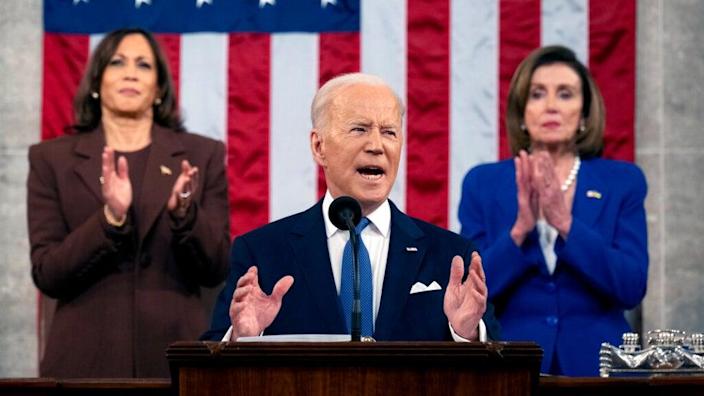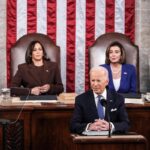
President Biden on Tuesday delivered his first State of the Union address under the cloud of the Russian invasion of Ukraine, projecting unity among U.S. lawmakers and allies abroad and calling out Russian President Vladimir Putin.
“Six days ago, Russia’s Vladimir Putin sought to shake the foundations of the free world thinking he could make it bend to his menacing ways. But he badly miscalculated,” Biden said.
“Putin’s latest attack on Ukraine was premeditated and totally unprovoked. He rejected repeated, repeated efforts at diplomacy. He thought the West and NATO wouldn’t respond. He thought he could divide at home, in this chamber, in this nation. He thought he could divide us in Europe as well,” Biden said. “Putin was wrong. We are ready. We are united.”
Biden spent the first 10 minutes of his 62-minute address to Congress speaking about the unfolding crisis in Europe before turning to domestic priorities such as addressing inflation and the COVID-19 pandemic.
He used the address to announce plans to ban Russian aircraft from American airspace, joining the European Union and Canada in taking such a step, and highlighted a move by the U.S. and 30 countries to release 60 million barrels of oil from strategic reserves to address energy price spikes driven by the conflict.
“We stand ready to do more as necessary, united with our allies,” Biden said. “I want you to know, we’re going to be OK.”
“When the history of this era is written, Putin’s war on Ukraine will have left Russia weaker and the rest of the world stronger,” Biden said.
Biden’s rhetoric on Ukraine, and particularly his recognition of the Ukrainian ambassador to the United States sitting next to the first lady, drew bipartisan applause as he vowed to remain tough on Putin. Members of both parties donned blue and yellow, a nod to the colors of the Ukrainian flag.
Other parts of the address drew much more partisan reactions.
When Biden denounced tax cuts for wealthy Americans passed during the Trump administration, Democrats jeered. Republican applause was sparse as Biden launched into plans for his domestic agenda for the coming year, and some Republicans chanted “Build that wall” as Biden spoke about immigration.
The president sought to rebut Republican criticism in the days leading up to the address that Biden had set the economy back, pointing to record high inflation that was hurting consumers and middle-class families in particular.
Biden touted the 6.5 million in jobs gains last year and highlighted the passage of the bipartisan infrastructure law last fall, announcing plans to start fixing 65,000 miles of highway and 1,500 bridges in need of repair this year as the law is implemented.
He recognized Intel CEO Pat Gelsinger, who was a guest of first lady Jill Biden, to note growing investments in U.S. manufacturing.
And, seeking to revitalize his stalled agenda in Congress, the president announced a rebrand of his Build Back Better proposal as his plan to “build a better America.” He reframed his economic plan as a way to fight inflation, calling on Congress to act to reduce prescription drug costs, cut energy costs by investing in climate-friendly technologies, and reduce child care costs.
“Let’s get this done,” Biden said. “We all know we got to make changes.”
Biden also called on the Senate to confirm his nominees to the Federal Reserve, who have been held up amid Republican opposition to some of the picks, noting that much of the power to address inflation lies with the Fed.
Biden made a fresh but familiar appeal for unity, calling on Democrats and Republicans not to see one another as “enemies” but as “fellow Americans.” He offered some agenda items that members of both parties could work on together, including fighting the opioid epidemic and implementing privacy protections for children on social media.
Much of his speech echoed the themes of his addresses to supporters when he travels, calling for corporations to pay their fair share of taxes, boosting the middle class, recalling his Scranton, Pa., roots and touting the nation is stronger when it works together.
“As hard as these times have been, I am more optimistic about America today than I have been my whole life,” Biden said.
Some Democrats have been pessimistic about their chances in November, citing historical trends, inflation and the persistent COVID-19 pandemic. But Tuesday marked something of a turning point in the government’s approach to the virus.
Masks were not required in the chamber, and most lawmakers went maskless in a bid to signal it was time to turn the page to a new phase of the pandemic.
“Last year, COVID-19 kept us apart. This year, we’re finally together again,” Biden said after he entered the chamber without a face covering.
During the address, Biden pointed to widespread vaccinations, the availability of booster shots and treatments, and more widely accessible testing as reasons for optimism that the nation can safely return to normal.
“We will continue to combat the virus as we do other diseases. And because this virus mutates and spreads, we have to stay on guard,” Biden said.
This story was updated at 11:02 p.m.




